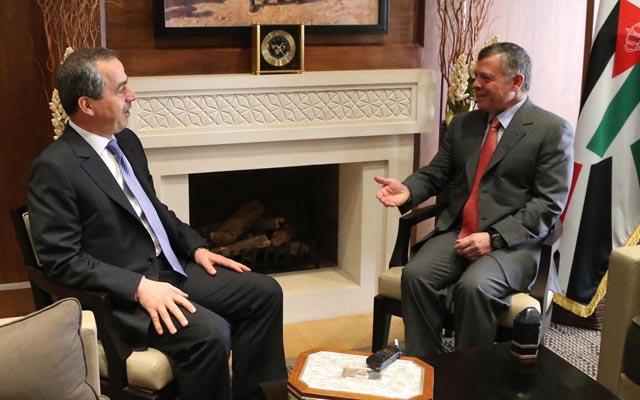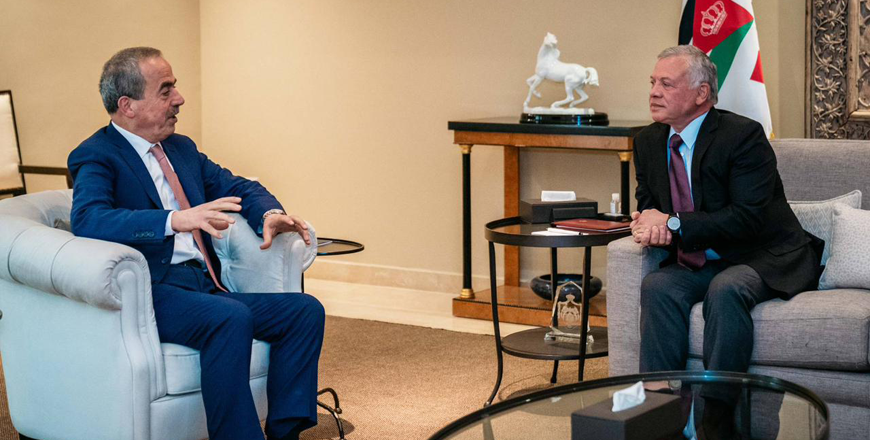You are here
Arab summit comes at time of critical challenges — King
Mar 22,2014 - Last updated at Mar 22,2014

AMMAN — His Majesty King Abdullah has stressed that the Arab summit comes at a time the Arab world is facing critical economic and geopolitical challenges.
In an interview with the London-based Al Hayat newspaper by Editor-in-Chief Ghassan Charbel, the King said: “The summit coincides with Arab countries’ dire need to restore the momentum of joint action as a framework to address the challenges at hand. Individual states looking inward and focusing on internal problems and priorities have become the main form of Arab action.” (see full text)
The King also referred to his meeting with US President Barack Obama, noting that he focused on the centrality of the Palestinian issue and the link between security and stability of the region and beyond with a just and comprehensive solution. The King added: “The Palestinian-Israeli conflict is the longest-lived in the region, and so the ensuing injustice continues. Solving this conflict will be a prerequisite to addressing several other challenges in the region… I also stressed the importance of upholding Jordanian interests in final status issues because in order to have a just and sustainable solution, the higher interests of Jordan, related to final issues, must be guaranteed, especially for Jerusalem, refugees, borders, security and water.”
Regarding Syria, the King warned against the threats ensuing from the continuing crisis, which has entered its fourth year. He also highlighted the impact of such a prolonged crisis on the region and the world, particularly rising extremism and terrorism and the apparent spillover of sectarian conflict and terrorism to some of Syria’s neighbours, let alone the increasing flow of refugees, and the tremendous pressure they place on the capabilities and resources of Jordan and other neighbours of Syria. The King also said: “I have underlined the importance of providing relief and humanitarian aid to the refugees in host countries and inside Syria.”
Asked about Jordan’s priority issues to be included in the summit’s agenda, the King referred to the Palestinian cause and said: “We will highlight the need to support the peace process, in line with the Arab Peace Initiative and relevant international resolutions, in a way that meets the aspirations of the Palestinian people to establish their independent state on their national soil with East Jerusalem as its capital, thereby ending the conflict in the region. At the same time, we need to ensure that Jordan’s rights and higher interests related to final status issues are safeguarded.”
As for the current situation in Egypt and the future, the Monarch noted that Jordan does not interfere in the internal affairs of any of fellow Arab countries. The King added that his assessment of the situation in Egypt is based on the importance of restoring security and stability to this country.
Asked about the success of Jordan and its leadership in dealing specifically with the Arab Spring and the possibility for the Muslim Brotherhood to return to the heart of political life, the King said: “We in Jordan have chosen a third way: Political life has not remained stagnant, yet we have not leapt into the unknown. Moreover, we have not reduced reform to only elections. Rather, we have established an integrated and comprehensive system of democratic laws, institutions and practices.”
He added: “The core target of political reform is the Jordanian citizen. All that has been achieved was meant to empower the individual to participate in the decision-making process. Citizens elect deputies, who, in turn, choose the government at the helm of the executive branch. At that point, a cycle of legislation and oversight starts, exercised by deputies, who are overseen by their voters. Citizens express their satisfaction with the performance of their deputies as they take part in the next elections.”
Charbel asked the King whether he could accomplish reform in Jordan in light of the enormous debt, along with the anti-corruption file, His Majesty replied: “Certainly, we can accomplish reform, and there are promising indicators. But before that, I want to make it clear that linking reform to the issues of debt and corruption requires accuracy and further explanation.”
“Regarding corruption, its depiction is often exaggerated and overstated. This has had a negative impact on investment attraction and led to the loss of thousands of new jobs. It is time to restore confidence through cultivating a culture of integrity. There was a statement by the head of the Anti-Corruption Commission, an independent watchdog, confirming that more than 90 per cent of complaints filed with the agency have been malicious. This example should also be considered in the context of Jordan’s ranking on Transparency International index. In 2012, Jordan came among the top 30 per cent of world’s countries on this index, ahead of all non-oil exporting Arab countries. These facts, which we always work to improve, do not receive the attention and analysis they deserve.”
Related Articles
AMMAN — His Majesty King Abdullah expressed confidence in the success of the upcoming Arab Summit in Jeddah, anticipating the start of a new
Following is an official translation of the full text of His Majesty King Abdullah’s interview with the London-based Al Hayat newspaper published on Saturday.
His Majesty King Abdullah on Tuesday said further sincere efforts are needed in the region to consolidate moderation, advance the principle of active citizenship and unleash the potential of future generations as the multiple conflicts in the region have created a fertile environment for the spread of extremism and terrorism.



















